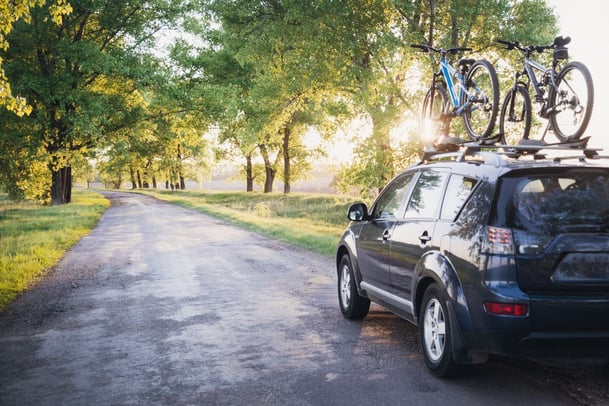
Winter weather and harsh weather are tough on cars. Now that spring is here, it’s time to pay closer attention to your hard-working vehicle. This post is about getting your car into top shape and prepping your car for spring.
Begin by giving your car’s exterior a thorough cleaning. Wash the undercarriage to remove corrosive road salts. If you go to a car wash, pay for premium service now. If you’re washing the car at home, add baking soda to warm water to remove as much of the corrosive salts as possible. This will protect the paint on your used car.
After thoroughly reviewing the car’s many systems, take it to a reliable service shop for a spring checkup. Costs for this service may vary.
Here’s what your checkup should include.
Tip #1: Check the Tires
Whether your tires are brand new, or you’ve been driving on them for a few years, check pressure levels on all four tires and the spare:
- Check tires for sufficient thread for safety. Place a quarter upside down into the tire treat that’s cool to the touch. If you see the top of George Washington’s head, the tire tread is too worn.
- Replace tires when flat rubber bars start to appear. Rotate your tiers each 5,000 miles to ensure even wear.
Tip #2: Check the Brakes
Winter driving is hard on your brakes. Your brakes must be in good shape to protect you and passengers in the vehicle. Ask a service tech to check the rotors, pads, and fluids.
If you recently bought a used car, make sure your brakes are in tip-top shape.
Tip #3: Check the Alignment and Suspension
Potholes that pop up in inclement weather can turn Houston’s highways into an obstacle course. Driving on uneven terrain can damage your vehicle’s suspension and alignment:
- If a steering wheel vibrates, or the car is pulling to one sign, check for potential alignment issues.
Tip #4: Check the Battery
Most recent model cars have sophisticated electrical systems. It’s a good idea to check your vehicle’s electrical systems now. Many service providers offer a free battery check to determine the strength of your battery. If it’s getting weak, replace it now to stave off future problems.
Tip #5: Don’t Forget to Check the Fluids
If you’ve ever run out of window washing fluids, you know it’s important to check your vehicle’s window washing, brake, power steering, and cooling system fluids. Ask your service tech to put a sticker on the windshield, to remind you it’s time for an oil change:
- Automotive experts recommend an oil change every 3,000 – 5,000 miles, depending on the age of your vehicle.
- Follow the manufacturer’s suggestions regarding oil viscosity and change intervals. Change the oil filer.
- Transmission fluid should be flushed every 20,000 – 50,000 miles. (Flushing will cost $100 - $200, but ignore it at your peril. Your transmission is at risk.)
- Check windshield wipers, lights, and belts during the spring checkup.
Tip #6: Top off the Coolant
Ensure that your vehicle’s engine is properly cooled as the weather gets warmer. Check that coolant levels are at the proper level.
Many vehicles come outfitted with a fluid level gauge. Consult the owner’s manual to learn how to check your particular model’s level. (Open the cap only when your vehicle is cool.)
If you don’t have a reliable mechanic, do an online search to find a service shop that’s appropriately licensed and insured. Ask the service if it warranties its work and for how long.
Tip #7: Replace Your Windshield Wipers
There’s nothing worse than losing a windshield wiper blade during a Houston spring or summer rain shower.
Ask the service tech to check your wipers so that it’s safe to navigate the highway.
Tip #8: Clean the Interior of Your Vehicle
Now that the exterior and working parts are in pristine working order, thoroughly vacuum and clean the interior. Remember how great it feels to drive a vehicle that’s clean and tidy.
Hire a detail shop or take your vacuum or dust buster to the parking space, garage or driveway now.
Tip #9: Check Your Vehicle Insurance Policy
Spring is the perfect time to review your auto insurance policy. Consider that the currency policy levels are high enough to cover claims that commonly occur during the transition from cool to warm weather. For instance, comprehensive coverage often covers damages left by an animal interaction but collision coverage may cover costs associated with running into a particularly awful pothole.
Tip #10: Safe Driving is Always in Season
- Drive more slowly when it’s raining in Houston. Don’t drive through large puddles to avoid the possibility of hydroplaning.
- Check your blind spot for motorcyclists and bikers who share the roads.
- Watch for road construction crews. It’s time to fix the highways after rough cold weather conditions. Slow down when entering a work zone and avoid any potholes.
- Stay alert for animals that dart across roads.
- Take care to keep pedestrians safe.
If you’re ready to get behind the wheel of a used car in Houston, Shabana Motors offers in-house financing to drivers who qualify.






